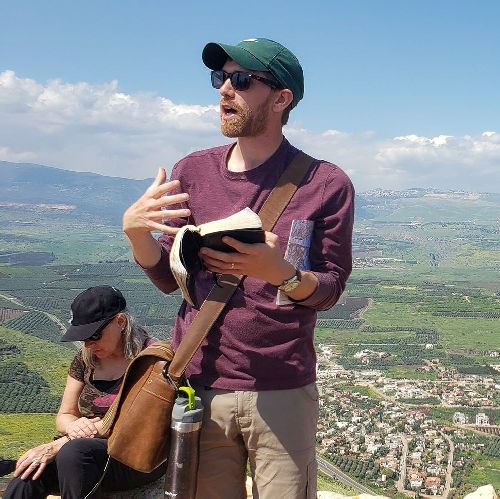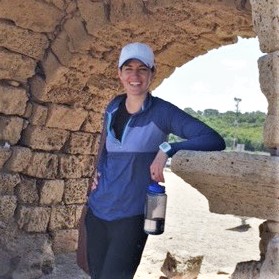
Jesus and His Times
Explore the land, historical context, and cultural setting of the Gospels.
JESUS AND HIS TIMES
Follow in the Footsteps of Jesus
What You Will Learn
This special two-week course emphasizes the geographical, historical, and cultural setting of Jerusalem, Judea, Samaria, and Galilee during the time of Jesus. Students will study the historical context of the Second Temple Period and learn how historical figures and world powers shaped the political, religious, and social environment of the world of Jesus and early Judaism.
What You Will Do
The field studies follow the basic chronology of the life of Christ, spending one week in the Galilee region and one week in the Jerusalem region. Sit on steps where early rabbis taught to better understand the context of Jesus’ teaching. Watch the sunset on the Sea of Galilee. Feel the personality of Herod through his massive building projects. All this and more will make Jesus and his ministry come to life in new ways.
Students and participants in this program will use maps created by Biblical Backgrounds.
When It Is Offered
This course is offered every summer during the first two weeks of July.
Those interested in a five-week period of study may combine the three-week Historical and Geographical Settings of the Bible program offered each June with the Jesus and His Times program offered in July.
Ready to Apply?
Follow the link below to submit your application to JUC.
Click here to apply!THE DETAILS
Sample Itinerary*
This is an example daily itinerary for the Jesus and His Times program:
Day 1: Arrival Day and Housing Check-In
Day 2-3: Program Orientation and Herodian Jerusalem Field Study
- Pool of Siloam
- Jewish Quarter
- Temple Mount
- Davidson Center
- Pools of Bethesda
Day 4: The Dead Sea Area Field Study
- Masada
- Ein Gedi
- Ein Feshka
- Qumran
- Dead Sea beach for swimming
Day 5: Bethlehem Field Study
- Bethlehem
- Shepherd's Field
- Church of the Nativity
- "Solomon's Pools"
- Herodium
Day 6: Exploration Day
Day 7: Upper/Lower Galilee Field Study
- Beth She'an/Scythopolis
- Nazareth
- Sepphoris
- Mount Arbel
- Kedesh Temple
- Bar'am
Day 8: Huleh Basin and Golan Heights Field Study
- Omrit
- Banias/Caesarea Philippi
- Gamla
Day 9: Sea of Galilee Field Study
- Sea of Galilee
- Bethsaida
- Capernaum
- Kursi
- Chorazin
- Magdala
- Tabgha/Primacy of Peter
Day 10: Jordan Valley Field Study
- Jordan River
- New Testament Jericho
- Wadi Qilt/Judean Wilderness
Day 11: Passion Week Field Study
- Mount of Olives
- St. Peter in Gallicantu
- Traditional Room of the Last Supper
- Herod’s Palace Area
- Church of the Holy Sepulchre
- Road to Emmaus
Day 12: Post-Resurrection Field Study
- Samaria
- Caesarea
Day 13: Exam, Departure Meeting, and Exploration Day
Day 14: Departure Day
Jordan Field Study (Optional):
Join a field study to Jordan for three days at the beginning of your program.**
View the average daily itinerary in Jordan and learn more about this field study.
Day 1: Gilead and Moab
- Jerash
- Jabbok River
- Moabite capital of Dibon
- Arnon Gorge
Day 2: Edom and the Nabateans
- Petra
- Edomite capital of Bozrah
Day 3: Ammon and the Medeba Plateau
- Ammonite capital of Rabbah/Amman Citadel
- Madaba
- Mount Nebo
Day 4: Program Day 2 (Begins Program Orientation and Herodian Jerusalem Field Study)
*All itineraries are subject to change due to logistical
reasons or the preference of the instructor or group leader.
Your final program calendar will be presented to you upon arrival.
**The Jordan Extension requires a minimum of seven
participants.
Short-Term Studies Program Faculty

Paul Wright, Ph.D.

Spencer Elliott, M.A.

Elaine Phillips, Ph.D.

Perry Phillips, Ph.D.

John (Jack) Beck, Ph.D.

Chandler Collins, M.A.

Aubrey Taylor McClain, Ph.D.

John Monson, Ph.D.

Cynthia Parker, Ph.D.

Carl Rasmussen, Ph.D.

Brian Schultz, Ph.D.

Emily Thomassen, M.A.

Rebecca Pettit, M.A.
Important Information
JUC offers both on- and off-campus housing for our short-term students on nights when they will stay in Jerusalem. We also arrange accommodations with hotels when the class is traveling for field studies. The hotels furnish buffet-style breakfasts and dinners. JUC students are provided with lunches by JUC whether in Jerusalem or on field studies.
Jerusalem Off-Campus Housing
Students can choose hotel housing rather than JUC campus housing for an increased housing fee. While JUC cannot guarantee that students will stay at any particular place, each hotel we contract with is well-rated and in or adjacent to the Old City of Jerusalem.
Jerusalem On-Campus Housing
Students who opt to spend nights in Jerusalem on campus will stay in dormitory-style housing, with 2-6 persons (or sometimes more) to a room. The campus has limited housing for couples with no double beds available. According to season and demand, private rooms for couples on campus may be available. Shared bathroom facilities are a short walk away from each room, sometimes across a courtyard and up or down a flight of stairs.
JUC’s program is academically and physically rigorous, including up to twelve hour days in the field or longer. The field studies involve hours of walking, standing, and several hikes (although some are optional). There are usually opportunities to sit throughout the day and plenty of time on the bus. However, students should expect an intensely physical program and plan to sweat.
Everyone traveling to Israel must have a passport that expires at least six months after they plan to exit the country at the end of their program.
Short-term students who travel from countries that have normal relations with Israel will be issued a three-month tourist visa upon arrival. Students from the United States, Canada, and most European countries fall under this category. Students who come from countries that do not have normal relations with Israel will need to make prior visa arrangements before entering the country.
Read more about obtaining tourist visas here.
Students from countries who do not have a regular relationship with Israel may need additional security or immigration approval to study in Israel. Students from such countries may be responsible to apply for a visa at their nearest Israeli Consulate or Embassy, or JUC may need to apply on their behalf at the Ministry of Interior in Jerusalem. Visa decisions are entirely at the discretion of the Ministry of Interior, so JUC cannot guarantee that you will be able to obtain a visa successfully. Please contact us if you are from a country that does not have a regular relationship with Israel and have questions about this process.
Please note: if you plan to participate in the Jordan Extension and you are required to secure an entry visa into Israel prior to the start of the program, you MUST request and be granted a visa allowing multiple entries into Israel.
Yes! If you are interested in combining our 3-week Historical and Geographical Settings of the Bible program with our 2-week Jesus and His Times program, you may take both back to back. This would be a combined total of 6 academic credits unless you choose to audit the programs.
A suggested packing list for JUC students is available in our student manuals. For long-term students who will be at JUC for a semester or more, here is a list of what to pack. For short-term students who will be at JUC for a few weeks, here is a list of what to pack.
We take the safety of our students with the utmost seriousness and have a proven track record of operating for over 60 years in the Holy Land. Click here for detailed information about how JUC handles local issues related to safety and prepares students to do the same.
Contact Us
Send us a note and we'll be in touch.








